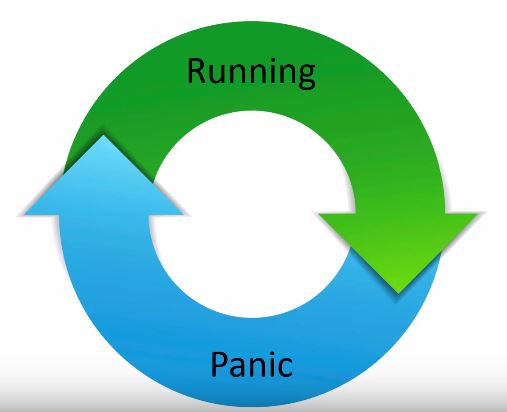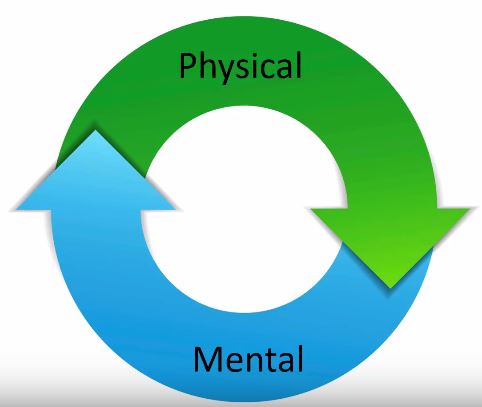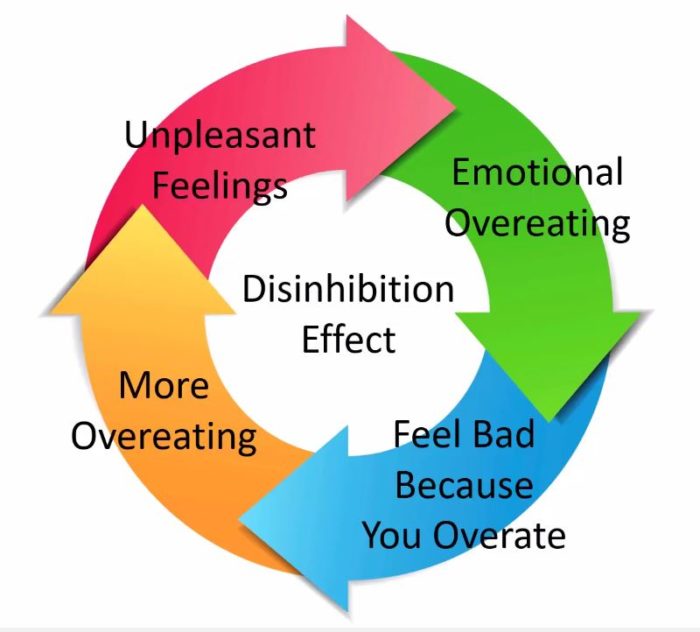Let’s really dig into emotional eating: what it is, and how to stop it…
Let’s compare 2 hypothetical people. One is a man who is 175 pounds, and let’s say that for his height, that’s a normal weight. The other guy is the same height, but he’s 350 pounds. Now…do you think the second guy is really THAT hungry? Do you think real physical HUNGER is what caused him to eat so much food that he became twice as heavy? 175 pounds overweight?
Of course not. That man is eating way more than he physically needs. So the reason he eats so much is liable to be emotional.
We know that emotions cause high-risk behavior. Think about it: if a person is in a highly emotional state, they’re much more likely to get in a fight, or cheat on their spouse, or gamble a lot of money. When you think about it that way, overeating is a pretty tame response by comparison.
There are 3 problems with these emotional reactions.
1) The Emotional Reaction Itself Is Like Adding Fuel to the Fire
Imagine you’re walking along the sidewalk, and you walk by an alley, and you see something out of the corner of your eye. You hear a crash. In your mind, you imagine that someone is trying to mug you.
Your reaction might be to run away.
Now when you’re afraid, how does running make you feel? It makes the fear stronger, doesn’t it? The act of physically running is going to exacerbate your fear and your panic and make it worse:

Similarly, if you’re feeling depressed and your reaction is to lie in bed, lying in bed is going to make the depression worse. It’s going to reinforce any feelings of loneliness or helplessness, and lead to ruminating over negative thoughts.
As a side-note, if you want to know why this happens, it’s because our physical body has a strong influence over our emotions:

For example, research shows that if you force yourself to smile…you’ll start to feel happier. If you hold yourself with a dejected-looking posture, you’ll feel shy and timid, but if you hold yourself up straight and tall, you’ll feel more assertive and confident. This is why running will increase fear and lying still will increase depression.
Similarly, if you’re depressed and you start eating ice cream, the act of eating ice cream because you’re sad is liable to make you feel a little pathetic on top of the depression, causing an emotional spiral that makes you feel even worse, which makes you even more likely to eat again.
Eventually, you can get stuck in a cycle. You overeat as a way to cope with bad feelings, but the overeating causes more bad feelings. And the way you cope with those bad feelings…is with more overeating! Researchers call this the disinhibition effect:

2) Emotional Reactions Often Cause Other Complications That Make Things Worse in the Long Run
Recognize that emotional reactions are a way of trying to gain instant gratification. This makes them shortsighted.
If you’re lonely, you might call your ex as a way of trying to feel better immediately. The problem is, spontaneously calling your ex is liable cause complications that make you feel worse in the long run. Maybe they don’t your answer your call, or maybe they tell they don’t want to see you. Or, maybe you end up rekindling a bad relationship.
Similarly, if you cope with feelings of loneliess by eating, that will cause weight gain, which is liable to decrease your self-esteem, which may make you feel less socially confident. Which will make your feelings of loneliness even worse.
Not to mention, overeating also often causes a secondary emotion of guilt after the fact.
In both of these examples, we’re trying to soothe ourselves, yet we end up sabotaging ourselves instead. A better long-term strategy to deal with loneliness might be to call up a friend or family member to reinforce important relationships, or to get out of the house and try to meet some new people.
3) These Emotional Reactions Often Become Automatic, and We Do Them Without Even Realizing It
The more you give in to these emotional urges, the more you reinforce them and the more ingrained they become. Over time, these reactions can start to become automatic behaviors.
That’s why mindfulness is so important: we have to recognize these behaviors when they happen. Otherwise, they’ll run on autopilot, making things worse and worse over time.
And when you can start to recognize these urges, when you’re mindful of them, you’ll start to understand the nature of urges. Which is this: they come and go. All urges pass. Usually sooner than you think.
For example, if you get the urge to open a bag of chips, that urge might feel powerful, but if you can sit with that urge for a few moments…don’t resist it, just sit with it–they call this “urge surfing,” by the way; we’ll talk about it in a later video…then after a few short moments, the urge will go away.
It may come back again later, but again, it will pass. That’s how urges are.
There are specific emotions that are specifically tied to overeating, and those are:
- Sadness
- Anger
- Loneliness
- Anxiety, worry, or nervousness (these feelings can actually cause a “shaky” sensation that feels a little like hunger)
- Stress
- Happiness
- Boredom
Depending on your personality, you may be more prone to some of these feelings than others.
Now as I’ve said, emotional eating can be a result of avoiding these emotions. If you’re lonely or bored, you might eat to distract yourself from those unpleasant feelings. This particularly happens when you lack mindfulness and acceptance.
On the other hand, you can also eat as a way of trying to grab onto enjoyable feelings. To try and extend the pleasure of a great meal, for example.
Now that we’ve covered the basics of what emotional eating is, in the next video you’re going to learn a few common scenarios that lead to emotional eating.
Get The Entire Course: Tame Your Inner Cookie Monster
Click here to get this entire course for $10 (90% off).
(The coupon code should already be applied, but if it’s not, just enter coupon code YOUTUBE.)